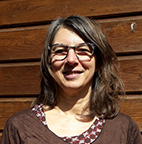Prior to the 27th Science Council of the Foundation, we invite you to get to know the members (past and present) of our Science Council. Interview with Caitriona Carter, Research professor in political science (Irstea).

Why did you become a researcher?
It is an interesting question, and it is not a question I have often been asked. I have been thinking about that, and I think I became a researcher because I have always been keen to support people making changes in their lives. As a political scientist – political science being a discipline much interested in actors (public, collective, private) and power – one can support people in this way, by producing knowledge about political change, especially for non-dominant actors or social groups. For instance, in my work, I have studied how actors have made changes in the name of sustainability; how they have acquired power and the political and institutional resources they have mobilised to do this. One can produce results on how public policy shapes lives, how it is made and in whose interests it is made. This knowledge is important because public policy plays a critical role in sustainability transformations, for example, facilitating or blocking transitioning process.
What is a “scientific community”?
A scientific community can be a number of different things. First of all the term can refer to all scientists, as distinct from other professions. It can also refer to a disciplinary cohort, such as the political science community, with its association, etc. A scientific community can also be an organisational one: I work at INRAE, which has its own institutionalised community. We as an organisation have our own shared research programmes and priorities, which might differ from the political sciences community’s…
A 4th kind of scientific community is a group of scientists who join forces to work on shared questions, from different disciplines. It can be a more “spontaneous community”, like the Labex Agro for instance, even it then continues to work for several years. We are currently seeking to build one such community in Bordeaux, a “Grand programme de recherche” entitled “Tackling global change: integrated approaches for people and environment”. One of today’s challenges is how to move between these communities, and how to build one’s identity within these communities. Because I really think science is a collective endeavour: you don’t do science on your own.
What are your ambitions and expectations regarding your participation in Agropolis Foundation Science Council?
It is going to be my first meeting this week, I am quite excited to learn about all the research taking place in the LabEx Agro community, and to be able to contribute to the discussions, promoting scientific quality and the structuring effects of projects. As an INRAE representative, I will have an institutional role of course. But I think what is important for me is that we, as science council members, have another role as well: to ensure that the selection rules are applied fairly, whatever the disciplines or topics concerned. It is more of an oversight function. I am looking forward to our discussions and am sure that I will learn a lot.